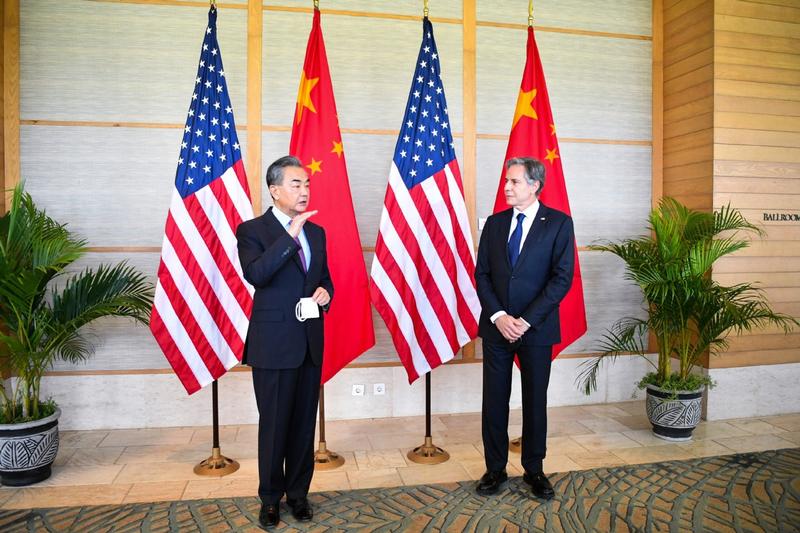 State Councilor and Foreign Minister Wang Yi had a five-hour-long meeting with US Secretary of State Antony Blinken in Bali on Saturday after the G20 Foreign Ministers' conference. (PHOTO / XINHUA)
State Councilor and Foreign Minister Wang Yi had a five-hour-long meeting with US Secretary of State Antony Blinken in Bali on Saturday after the G20 Foreign Ministers' conference. (PHOTO / XINHUA)
By urging Southeast Asian nations to avoid being used as "chess pieces" by the West, State Councilor and Foreign Minister Wang Yi was not warning the countries, as some Western media have claimed, but advising them to objectively evaluate the situation in the region.
"At the moment many countries in the region, including in the ASEAN region, are under pressure to take sides," Wang said in his speech at the Association of Southeast Asian Nations secretariat in Jakarta, Indonesia, on Monday.
He urged the region to insulate itself from geopolitical calculations and the trap of the law of the jungle. "The future of our region should be in our own hands," he said.
The fact that multiple senior officials of the Joe Biden administration, including Vice-President Kamala Harris, Secretary of State Antony Blinken, Secretary of Defense Lloyd Austin and Deputy Secretary of State Wendy Sherman, have made sales trips to the region since the second half of last year in an effort to get the Southeast Asian countries to buy into Washington's "Indo-Pacific strategy" shows how eager Washington is to have its hands on the region's helm.
But the course the US has charted for the region is one that will harm the internal cohesion of ASEAN and the region's development prospects.
What the US is looking for is not equal partners but submissive followers that can abide by the US' rules and offer it market, labor, resources, energy and be its proxies if necessary.
As the experience of the European Union shows, accepting offers from the US, be they in the form of security or trade, means ASEAN would surrender its own initiative and autonomy.
The Southeast Asian countries are well aware that any bait being offered is attached to a hook and string, which is why the US is finding the "Indo-Pacific strategy" such a hard sell.
The ASEAN members are also well aware that any "commitments" the US makes to the region are only an expediency. Even the meager assistance that the Biden administration promised to provide at the May summit has failed to materialize.
In contrast, China and ASEAN countries treat each other as equal partners with mutual respect.
Wang said on Monday that when he spoke with Blinken on the sidelines of the G20 foreign ministers' meeting on Friday, he proposed that China and the US discuss the establishment of rules for positive interactions in the Asia-Pacific, the core elements being the support of ASEAN centrality and upholding the existing regional cooperation framework, which is based on ASEAN-led mechanisms.
For ASEAN to uphold its centrality in the region it should reject the "fake regional cooperation" being touted by the US, which is aimed at ostentatiously decoupling the regional economy from China. It should also reject the expansion of NATO to the region, lest the US-led alliance tries to engineer a similar misfortune to that unfolding in Ukraine in the region.


